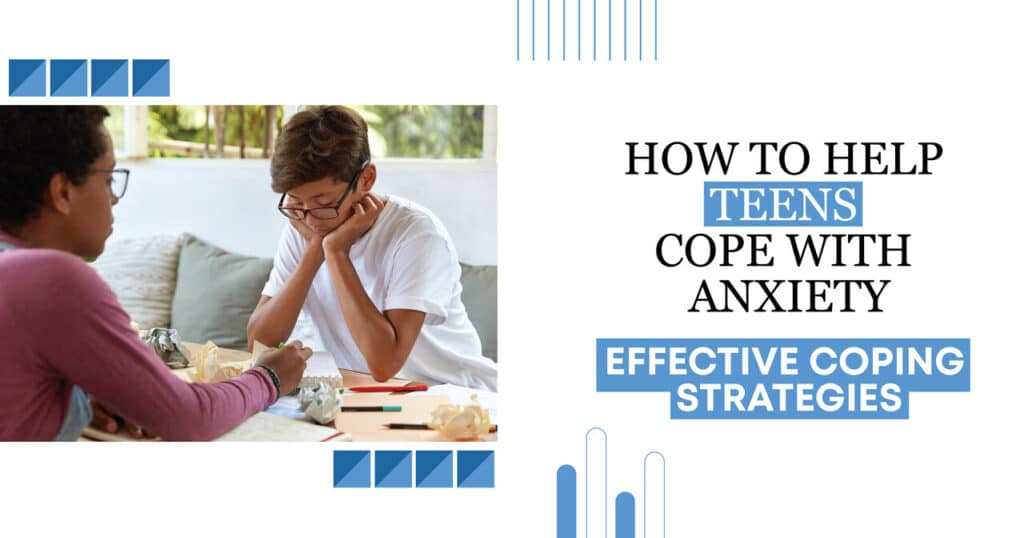Teen anxiety is a severe concern for youth who are under stress due to pressures from academia, social demands, and personal vulnerabilities. According to the National Institute of Mental Health, almost 32% of all adolescents will experience an anxiety disorder at some point. Therefore, how to cope with teen anxiety is the most important objective. This blog post provides coping strategies for teen anxiety as a road to resilience and emotional well-being.
What Is Teen Anxiety?
Teen anxiety is more than just tension or nervousness is the persistent feeling of fear, unease, or dread that may influence a teen’s ordinary level of emotional and physical well-being. Anxiety in teens differs from mere passing worry because it lasts and worsens, preventing them from participating generally in activities such as school work, social events, or personal family relationships.
It can take several different forms, such as generalized anxiety, social anxiety, and specific phobias, among others. In general, a lot of teen anxiety revolves around sources that are particular to the teenage years. These include:
Academic Pressure
The competitive world today makes it difficult for teenagers to attain and conquer. Teens are worried about exceeding expectations through their grades. Exam pressure, maintaining an exemplary academic record, and participating in extracurricular activities can be stressful when teens fear that they might fail to meet parental or societal expectations.
Social Expectations
During adolescence, teens are generally mature enough to perceive the subtleties of social interaction. They are focused on how to get along with friends, keep the friendship intact, or be accepted. An exaggerated fear of rejection or judgment often builds into social anxiety when it complicates the process of making teens feel at ease with others.
Life Transitions
They are subjected to most changes in their lives: on the way toward transition commencements of changing schools, getting ready for college, or family changes. In any case, these changes raise a sense of discomfort and uncertainty that may provoke anxiety.
Teen anxiety is not like everyday stress, as it can be chronic and relentless at some point. This can be intense and all-encompassing to a level where good quality of life has dramatically changed for teens. Early detection and intervention are termed imperative aspects of offering adequate practical teen mental health support before it becomes too much to handle and more challenging to take care of.
Common Causes of Teen Anxiety
There are many causes of anxiety in teens, but they are not caused by one single factor. Instead, it is a combination of personal and external factors. Here are some of the most common ones:
- Family Dynamics. Problems with family are one of the significant causes of anxiety in teenagers. Separation, financial issues, or parental conflict can all turn into an unpleasant anomaly in the mind of adolescents, making it uncertain emotionally. The birth of a new sibling or even the parent’s job loss is another condition that creates stress.
- Traumatic Events. People victimized by bullying, accidents, or the loss of a loved one will be traumatized for life. Teenagers might not know how to overcome such experiences that give rise to anxiety. These traumas trigger Post-Traumatic Stress Disorder (PTSD), and once anxiety symptoms set in, they prove so pervasive that they interfere with functioning in daily life.
- Social Media Influence. Most teenagers are exposed to idealized images and experiences via social media. The pressure of keeping up with a curated, “perfect” online persona always creates inadequacy, comparison, and self-doubting feelings. It usually sets in when they see others engaging in something from which they feel excluded, pushing them to increase social anxiety and stress.
- Biological Factors. Biologically based causes can also trigger anxiety. Teenagers who have parents with a history of mental disorders, such as anxiety disorders or depression, are more likely to become anxious themselves. Another cause is a chemical imbalance within the brain, especially concerning the neurotransmitter serotonin.
Understanding all the triggers of teen anxiety is crucial in truly bringing to life effective coping strategies for anxious teens. Caregivers and professionals can treat each teenager differently by addressing specific factors.
Symptoms of Anxiety in Teens
Since symptoms of anxiety in teenagers can be recognized early, it is very important to be aware of them. Although each teenager feels anxiety differently, there are frequent emotional, physical, and behavioral signs that parents should look out for:
- Emotional Signs. Teens begin to exhibit persistent concern or fear regarding things people may think are insignificant or laughable. Teens might become irritable, fidgety, or apprehensive. Most teenagers suffering from anxiety experience an intense dread of impending doom, which mostly occurs with the cooperation of evil thoughts or excessive worry over things that can’t be controlled at all.
- Physical Signs. Anxiety can manifest through various signs. Typical symptoms include tiredness, fatigue, trouble sleeping, muscle tension, headaches, racing heartbeat, or abdominal pain. In extreme cases, these symptoms can be so intense that the teenager may be unable to function normally, missing school or other social events.
- Behavioral Signs. The anxiety behavior in teenagers includes avoiding situations that are designed to invoke fear or anxiety. They may be avoiding going to school, avoiding socialization, or even withdrawing themselves from family and friends. Some teens also express perfectionism, a state of setting impossible standards to be met and feeling distressed in perceiving failure while unable to measure up to these unattainable standards. This may cause an undue strain on their school work and interpersonal life.
Parents, teachers, and caregivers should recognize the early symptoms of this condition. Preemptive treatment of teen anxiety can prevent the condition from developing into something worse. In a relief to the highly intense world of teen stress and anxiety, through support and guidance as well as coping strategies, a balance in life could be given to the teen.
How Can We Help Teens Cope With Anxiety?
The first stage in helping such teenagers would be the identification of anxiety. Once symptoms are known, various coping strategies for anxious teens could benefit them to manage their emotions:
- Open Communication. Let the teen feel free to open up about his feelings and avoid judging them. Anxiety is a common phenomenon, and sharing one’s feelings has nothing wrong with it.
- Mindfulness and Relaxation Techniques. Teach teens to use mindfulness techniques, such as deep breathing or meditation. These can help reduce stress and thus ease their worried feelings.
- Physical Activity. Exercise effectively manages anxiety. It releases endorphins, the brain’s natural “feel-good” chemicals, creating an effective mood elevator and reliever of stress.
- Therapeutic Support. Cognitive Behavior Therapy is highly effective with most teenagers who have been diagnosed with anxiety disorders. It helps the teen learn to change negative thinking patterns and consider specific situations or scenarios in a more productive, constructive manner. A licensed therapist can help point out what triggers these episodes and help develop strategies to cope with these events in their best individual interest.
- Structured Routine. A predictable life can be under teens’ control. Helping them establish healthy habits such as sleep, nutritious meals, and time to rest reduces feelings of being anxious.
In combination, these techniques help teens establish emotional resilience that can help them handle anxiety and thrive despite their challenges.
Why Coping Strategies Are Essential for Teens
Long-Term Impact of Unmanaged Anxiety
Anxiety can lead to other effects, such as the ones listed below:
- They might start having low academic performance because they might not be in a position to focus or even attend classes.
- They might develop other mental disorders, for example, depression.
- Cruel health problems include stress-related diseases and headaches or digestive issues.
- Maladaptive coping mechanism: they might start using drugs and alcohol or self-destruction.
Equipped with anxiety management for teens, teens may prevent such results and, therefore, lay out the foundation for healthy adulthood.
Building Resilience in Teens
Resilience is the ability of the teenager to adapt to adversity and then bounce back when faced with specific difficulties. Teaching how to help teens with anxiety can be done through techniques like problem-solving or regulation of emotion, which enables teenagers to build confidence in dealing with the ups and downs of life.
A Lifelong Skillset
The ability to manage anxiety is well-crafted in those teens, and they carry it all through their adulthood to facing professional, personal, and societal challenges. Coping mechanisms like this will help maintain emotional balance and reduce stress among them.
Top Coping Strategies for Teen Anxiety
Mindfulness and Meditation
Mindfulness is paying attention to what’s going on in a non-judgmental way. Practices such as meditation, deep breathing, or progressive muscle relaxation can:
- Reduce anxiety by calming the nervous system.
- Improve concentration and focus.
- Improve emotional regulation.
Encourage teens to try some mindfulness apps or guided meditation videos. The above can make mindfulness practices more accessible and enjoyable.
Physical Activity
Exercise is one of the best-known anxiety management techniques. Endorphins support a more optimistic mood and more energy. Teenagers can participate in:
- Aerobic Exercise. Running, swimming, or cycling.
- Team Sport. Basketball, soccer, or volleyball to associate physical fitness with socialization.
- Yoga. It involves movement and mindfulness to help lower stress.
The best teen anxiety coping strategy is building an activity routine that includes regular physical activity.
Healthy Routines
A well-balanced and structured schedule can significantly minimize anxiety symptoms. Some of them include:
Support Groups | Help your teens be involved in a support group where they can feel empowered knowing each suffers from similarities, and it’s not the end of the world. |
| A Balanced Diet | Eat foods that contain omega-3 fatty acids, magnesium, and B vitamins that promote brain health. |
| Digital Detox | Time away from electronic devices can limit exposure to social media’s contagion-like effect and information overload. |
Creative Outlets
In creative pursuits, teenagers can work out their emotions. Options include
- Drawing or painting
- Playing any musical instrument
- Writing short stories, poetry, or recording one’s feelings.
Encourage the kid to attempt various creative avenues until he/she finds one that tickles his/her fancy.
Social Connections
Social support is essential for a teenager’s emotional well-being. Healthy relationships with family, friends, and mentors can reduce lonely times, provide reminders and support during stressful moments, boost emotional well-being, and provide a forum for open communication where adolescents feel comfortable communicating their feelings and participating in group activities that help them develop strong relationships with people.
When to Seek Professional Help
Recognizing the Signs
It’s important to seek professionals if a youth is:
- Showing significant symptoms such as panic attacks or suicidal ideation.
- Experiencing anxiety that gets in the way of their schoolwork, socializing, or relationships.
- Can’t cope with the use of self-help strategies.
Untreated, these are risk factors for losing their symptom to escalating and long-term impairment.
Types of Professional Support
There are a range of professional help options available for teen mental health support:
| Therapy | Cognitive-Behavioral Therapy (CBT) educates a young person about how to become aware of and how to begin operating in ways to manage intrusive negative thought patterns. |
| Medication | Medication is part of the treatment when the teen has a severe condition. |
| Support Groups | The feelings of loneliness will fade away when a teen is introduced to peers facing similar conditions. |
When these approaches are combined, they ensure broad care tailored to the teen’s needs.
How to Find Help
Parents and guardians can seek professionals through:
- Recommendations from school counselors or pediatricians.
- Searching for an online directory to find a licensed therapist with teenage experience.
- Reaching out to the local community center that provides mental health programs.
Qualified professionals are always available. This is an important step toward helping teens deal with anxiety effectively.
How Parents and Guardians Can Support Anxious Teens
Open Communication
Parents can be great influencers by opening up and communicating honestly with the teenagers. Tips include:
- Asking questions like, “What’s been on your mind lately?”
- Listen actively without trying to solve the problem immediately.
- Validate their emotions, though it may seem irrational.
This way, they develop trust in you, and the teenager feels more encouraged to share his or her concerns.
Leading by Example
Teenagers often act out what adults in their immediate surroundings do.
- Healthy stress management techniques include taking breaks during stressful periods, practicing gratitude, or journaling and should be practiced.
- Being optimistic about challenges.
Encouraging Professional Help When Needed
Normalize mental health care by talking about it in the same way as any other health concern. Illustrate how therapy or counseling can be a safe place for them to explore their thoughts and gain tools for managing anxiety.
Providing Resources
Arm teens with books, apps, and websites focusing on anxiety management for teens. Some recommendations include:
- Apps like Calm or Headspace on mindfulness.
- Books like The Anxiety Workbook for Teens by Lisa M. Schab.
- Online forums where they can meet with peers who are dealing with the same issues.
Call to Action
Teens facing anxiety need understanding, guidance, and practical tools to navigate their challenges. By implementing the teen anxiety coping strategies discussed here, parents, educators, and caregivers can make a lasting impact. From fostering open communication to encouraging healthy routines and seeking professional help, these steps provide a solid foundation for emotional well-being.
Do you know a teen struggling with anxiety? Don’t wait to take action. Explore our resources on how to help teens with anxiety and reach out to a mental health professional for guidance. Together, we can ensure every teen has the tools and support needed to thrive. Contact us today to learn more!
FAQ’s
- What are the most common triggers for anxiety in teens?
Common triggers include academic pressure, social challenges, family issues, and life transitions like moving schools or preparing for college. Additionally, social media and peer comparisons can exacerbate anxiety. Identifying these triggers helps in implementing effective teen anxiety coping strategies.
- How can I differentiate between everyday stress and anxiety in my teen?
While stress is temporary and often linked to specific situations, anxiety is more persistent and can occur without an obvious cause. Symptoms of anxiety include excessive worry, sleep disturbances, physical complaints like headaches, and avoidance behaviors. If these symptoms interfere with daily life, seek teen mental health support.
- Are there quick coping strategies for anxious teens during high-stress moments?
Some effective quick strategies include deep breathing exercises, grounding techniques (e.g., focusing on five things they can see or hear), or a brief walk to clear their mind. These methods can provide immediate teen stress and anxiety relief.
- When should I seek professional help for my teen’s anxiety?
Professional help is necessary if your teen’s anxiety becomes severe, leads to panic attacks, or disrupts their academic, social, or family life. Therapy, such as cognitive-behavioral therapy (CBT), and other forms of anxiety management for teens, can provide long-term solutions.
- How can I encourage my teen to open up about their anxiety?
Create a safe and supportive environment by practicing active listening and validating their feelings. Avoid judgment or dismissive comments, and lead by example by openly discussing your challenges. Providing resources on how to help teens with anxiety can also make it easier for them to share their concerns.





